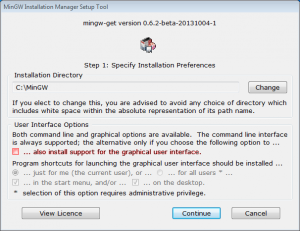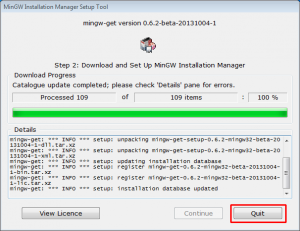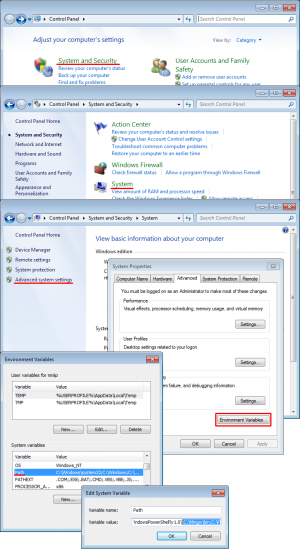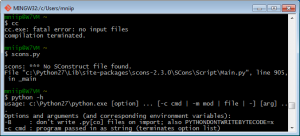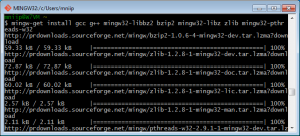Difference between revisions of "Compiling for Windows with scons"
(Newer versions of scons require another download to use multiple cores) |
(Add outdated notice) |
||
| (21 intermediate revisions by 6 users not shown) | |||
| Line 1: | Line 1: | ||
| + | {{Languages|Compiling for Windows with scons}} | ||
| + | |||
| + | '''ATTENTION: This guide is outdated as of 2021. Please use this guide for building any recent version of the game: [[Building TPT with Meson]]''' | ||
| + | |||
This guide is for compiling tpt from git with SCons, the official build system of tpt. You will need to install git, MinGW, python, and SCons in order to follow this guide. Setting everything up and then compiling tpt could take from 30 minutes to an hour depending on your internet connection and CPU speed. | This guide is for compiling tpt from git with SCons, the official build system of tpt. You will need to install git, MinGW, python, and SCons in order to follow this guide. Setting everything up and then compiling tpt could take from 30 minutes to an hour depending on your internet connection and CPU speed. | ||
Note: This guide does not include info on how to set up an IDE and edit the code. You will have to get an IDE yourself if you want to code easily. You may want to look at Code::Blocks or Eclipse, both good IDE's, or just use what you prefer, even a simple Notepad would work. You can configure them to automatically run the correct build command when done. If you want to use visual studio, follow that guide instead. | Note: This guide does not include info on how to set up an IDE and edit the code. You will have to get an IDE yourself if you want to code easily. You may want to look at Code::Blocks or Eclipse, both good IDE's, or just use what you prefer, even a simple Notepad would work. You can configure them to automatically run the correct build command when done. If you want to use visual studio, follow that guide instead. | ||
| − | If you get any problems, ask for help in the Development assistance section on [ | + | If you get any problems, ask for help in the Development assistance section on [https://powdertoy.co.uk/Discussions/Categories/Topics.html?Category=5 The Powder Toy forums]. |
== Downloads == | == Downloads == | ||
| − | + | Start by downloading Git for Windows at: https://git-for-windows.github.io/ | |
| − | Start by downloading | + | <br>If you want to install it for all users you need to run the installer as administrator (or else it will assume you want to install it for just yourself). If you use windows 10 you may want to select to use the windows-like console instead of the one they provide. Besides that, it is recommended to use the defaults in the rest of the installer. |
| − | <br> | ||
[[File:Mingw-gui.png|thumb|]] | [[File:Mingw-gui.png|thumb|]] | ||
| Line 16: | Line 19: | ||
<br>The installer is a little bit confusing, when it gets to 100% you are supposed to press "Quit". | <br>The installer is a little bit confusing, when it gets to 100% you are supposed to press "Quit". | ||
| − | Now, download python at: | + | Now, download python at: https://www.python.org/ftp/python/3.6.4/python-3.6.4.exe |
<br>It is recommended you download the 32 bit version and not the 64 bit, since if not the SCons install may not work. | <br>It is recommended you download the 32 bit version and not the 64 bit, since if not the SCons install may not work. | ||
| − | When installing make sure the installation directory is "C:\ | + | When installing make sure the installation directory is "C:\Python36\". Everything else is default. |
| − | If you have multiple cores and want to use them to compile faster, you will also need to download the [ | + | If you have multiple cores and want to use them to compile faster, you will also need to download the [https://github.com/mhammond/pywin32/releases/download/b222/pywin32-222.win32-py3.6.exe pywin32 extensions] (not required). |
| − | Finally, get SCons, the build system, here: | + | Finally, get SCons, the build system, here: https://sourceforge.net/projects/scons/files/scons/3.0.0/scons-3.0.0-setup.exe/download |
<br>Hopefully it will find your python installation automatically. There pretty much aren't any settings to adjust. | <br>Hopefully it will find your python installation automatically. There pretty much aren't any settings to adjust. | ||
== Add variables to Path == | == Add variables to Path == | ||
[[File:Windows-path.png|left|thumb|]] | [[File:Windows-path.png|left|thumb|]] | ||
| − | You need to add the MinGW and python tools you just installed to your %path% in order to compile. Open Control panel, and go into System -> Advanced -> Environment variables. | + | You need to add the MinGW and python tools you just installed to your %path% in order to compile. Open Control panel, and go into System -> Advanced -> Environment variables. Before windows 10, it is located in System and Security -> System, and then hit "Advanced System settings" on the left and click "Environment variables" at the bottom. In Windows 10, right click the start button and click System -> Advanced -> Environment variables. At the bottom of the window there is a list, find "Path" there, select it, click Edit. |
| − | <br> | + | <br>In Windows 7 and 8, this variable is a semicolon-separated list, at the end you should add MinGW binaries directory, python directory and python scripts directory. That is, at the end you should add <code>;C:\MinGW\bin;C:\Python36;C:\Python36\Scripts</code>. If for some reason one of these is already in the path, don't add it again. You will need to restart git bash for changes to take effect. In Windows 10, you can just hit "New" and add each entry on a separate line. |
[[File:Windows-path-test.png|thumb|]] | [[File:Windows-path-test.png|thumb|]] | ||
| Line 37: | Line 40: | ||
== Getting Needed Libraries == | == Getting Needed Libraries == | ||
[[File:Mingw-get.png|thumb|]] | [[File:Mingw-get.png|thumb|]] | ||
| − | To complete MinGW installation, locate Git Bash in the start menu and open it. Copy the following into the terminal (right click the window's title and select Edit -> Paste). | + | To complete MinGW installation, locate Git Bash in the start menu and open it. Copy the following into the terminal (right click the window's title and select Edit -> Paste). (If that fails open command prompt and type in the command there) |
<code>mingw-get install gcc g++ mingw32-libbz2 bzip2 mingw32-libz zlib mingw32-pthreads-w32</code> | <code>mingw-get install gcc g++ mingw32-libbz2 bzip2 mingw32-libz zlib mingw32-pthreads-w32</code> | ||
Now we need to get a few libraries to compile TPT successfully. The others you need are SDL, Lua, and fftw. They can't be downloaded so easily, so you have to download them manually here: | Now we need to get a few libraries to compile TPT successfully. The others you need are SDL, Lua, and fftw. They can't be downloaded so easily, so you have to download them manually here: | ||
| − | <br>https:// | + | <br><!--[https://drive.google.com/uc?id=0B1XWtCTn2YPAZ3dqSU5CbjE4OXM&export=download MingwLibraries.zip]-->[https://starcatcher.us/TPT/MingwLibraries.zip MingwLibraries.zip] |
<br>Copy both of the folders into your C:\MinGW | <br>Copy both of the folders into your C:\MinGW | ||
| + | <br>You'll also need libsdl2, you can get that [https://www.libsdl.org/download-2.0.php Here] Under Development Libraries download <code>SDL2-devel-2.0.8-mingw.tar.gz</code> | ||
== Getting the Source == | == Getting the Source == | ||
| Line 49: | Line 53: | ||
Create a new folder where the source will be. Open it, right click and select "Git Bash here". A bash prompt will open. | Create a new folder where the source will be. Open it, right click and select "Git Bash here". A bash prompt will open. | ||
<br>The following command will obtain the source and all historically important information about it. | <br>The following command will obtain the source and all historically important information about it. | ||
| − | <br><code><nowiki>git clone http://github.com/ | + | <br><code><nowiki>git clone http://github.com/The-Powder-Toy/The-Powder-Toy.git .</nowiki></code> |
<br>The period at the end means the source will download into the current directory. If you omit it, a new directory will be made '''inside''' current one. | <br>The period at the end means the source will download into the current directory. If you omit it, a new directory will be made '''inside''' current one. | ||
<br>After the command has finished, you'll find out that the folder contains a lot of stuff, like, umm, TPT source. | <br>After the command has finished, you'll find out that the folder contains a lot of stuff, like, umm, TPT source. | ||
| Line 58: | Line 62: | ||
<br>P.S. If you have a multicore processor, and installed the pywin32 extensions earlier, use <code>scons.py -j#</code>, replacing # with the number of cores you have, ex. -j4 for 4 cores. This will make it compile with all the cores, making it go much faster. | <br>P.S. If you have a multicore processor, and installed the pywin32 extensions earlier, use <code>scons.py -j#</code>, replacing # with the number of cores you have, ex. -j4 for 4 cores. This will make it compile with all the cores, making it go much faster. | ||
| − | |||
<br>[[Scons_command_line_flags|List of all sconscript flags you can use]] | <br>[[Scons_command_line_flags|List of all sconscript flags you can use]] | ||
Latest revision as of 08:59, 3 April 2021
| Language: | English • 中文 |
|---|
ATTENTION: This guide is outdated as of 2021. Please use this guide for building any recent version of the game: Building TPT with Meson
This guide is for compiling tpt from git with SCons, the official build system of tpt. You will need to install git, MinGW, python, and SCons in order to follow this guide. Setting everything up and then compiling tpt could take from 30 minutes to an hour depending on your internet connection and CPU speed.
Note: This guide does not include info on how to set up an IDE and edit the code. You will have to get an IDE yourself if you want to code easily. You may want to look at Code::Blocks or Eclipse, both good IDE's, or just use what you prefer, even a simple Notepad would work. You can configure them to automatically run the correct build command when done. If you want to use visual studio, follow that guide instead.
If you get any problems, ask for help in the Development assistance section on The Powder Toy forums.
Contents
Downloads
Start by downloading Git for Windows at: https://git-for-windows.github.io/
If you want to install it for all users you need to run the installer as administrator (or else it will assume you want to install it for just yourself). If you use windows 10 you may want to select to use the windows-like console instead of the one they provide. Besides that, it is recommended to use the defaults in the rest of the installer.
Next, download MinGW, the compiler: http://sourceforge.net/projects/mingw/files/latest/download?source=files
When it'll ask you what folder to install, make sure it's "C:\MinGW". Uncheck "install support for the graphical user interface". At the moment of writing it is totally silly and unusable.
The installer is a little bit confusing, when it gets to 100% you are supposed to press "Quit".
Now, download python at: https://www.python.org/ftp/python/3.6.4/python-3.6.4.exe
It is recommended you download the 32 bit version and not the 64 bit, since if not the SCons install may not work.
When installing make sure the installation directory is "C:\Python36\". Everything else is default.
If you have multiple cores and want to use them to compile faster, you will also need to download the pywin32 extensions (not required).
Finally, get SCons, the build system, here: https://sourceforge.net/projects/scons/files/scons/3.0.0/scons-3.0.0-setup.exe/download
Hopefully it will find your python installation automatically. There pretty much aren't any settings to adjust.
Add variables to Path
You need to add the MinGW and python tools you just installed to your %path% in order to compile. Open Control panel, and go into System -> Advanced -> Environment variables. Before windows 10, it is located in System and Security -> System, and then hit "Advanced System settings" on the left and click "Environment variables" at the bottom. In Windows 10, right click the start button and click System -> Advanced -> Environment variables. At the bottom of the window there is a list, find "Path" there, select it, click Edit.
In Windows 7 and 8, this variable is a semicolon-separated list, at the end you should add MinGW binaries directory, python directory and python scripts directory. That is, at the end you should add ;C:\MinGW\bin;C:\Python36;C:\Python36\Scripts. If for some reason one of these is already in the path, don't add it again. You will need to restart git bash for changes to take effect. In Windows 10, you can just hit "New" and add each entry on a separate line.
To test if this worked, you can use git bash (if you already have this open, close it and restart it). Open your start menu, find "Git bash" somewhere there, probably in the git folder. Run it, it will display a shell. Type cc and press enter, it should say something like "cc.exe: fatal error: no input files, compilation terminated." That is alright, it means that it finds the compiler and everything works correctly. If instead you get "cc: command not found", then you did something wrong and it wasn't properly added to path. Check it again and make sure you typed it exactly.
Now type python -h, if you see "python: command not found", it can't find python, you probably didn't add it to path correctly, so check again. If it worked correctly, it will print a large amount of help text and exit.
Lastly, to check if SCons is in path, type scons.py, it should say "scons: *** No SConstruct file found", that's alright, since we don't even have the source at this point. If it says "scons.py: command not found", it means you've probably done something wrong in path setup.
Getting Needed Libraries
To complete MinGW installation, locate Git Bash in the start menu and open it. Copy the following into the terminal (right click the window's title and select Edit -> Paste). (If that fails open command prompt and type in the command there)
mingw-get install gcc g++ mingw32-libbz2 bzip2 mingw32-libz zlib mingw32-pthreads-w32
Now we need to get a few libraries to compile TPT successfully. The others you need are SDL, Lua, and fftw. They can't be downloaded so easily, so you have to download them manually here:
MingwLibraries.zip
Copy both of the folders into your C:\MinGW
You'll also need libsdl2, you can get that Here Under Development Libraries download SDL2-devel-2.0.8-mingw.tar.gz
Getting the Source
Now we're actually going to get TPT's source. We're going to behave like a pro, and use git (we have git bash after all).
Create a new folder where the source will be. Open it, right click and select "Git Bash here". A bash prompt will open.
The following command will obtain the source and all historically important information about it.
git clone http://github.com/The-Powder-Toy/The-Powder-Toy.git .
The period at the end means the source will download into the current directory. If you omit it, a new directory will be made inside current one.
After the command has finished, you'll find out that the folder contains a lot of stuff, like, umm, TPT source.
Compiling
Now to compile, run scons.py. It should check for libraries, then should start compiling (if anything fails, check config.log in the folder and post to pastebin.com if you need help figuring out what it means). Depending on your computer it will take from a few, to a few dozen minutes.
If your compilation succeeds, the exe will be placed in the build/ folder, so go run it and hope it works. If it does, you can now start modding tpt.
P.S. If you have a multicore processor, and installed the pywin32 extensions earlier, use scons.py -j#, replacing # with the number of cores you have, ex. -j4 for 4 cores. This will make it compile with all the cores, making it go much faster.
List of all sconscript flags you can use
-- written by mniip, edited by jacob1 -- revision 2 with screenshots, by mniip
